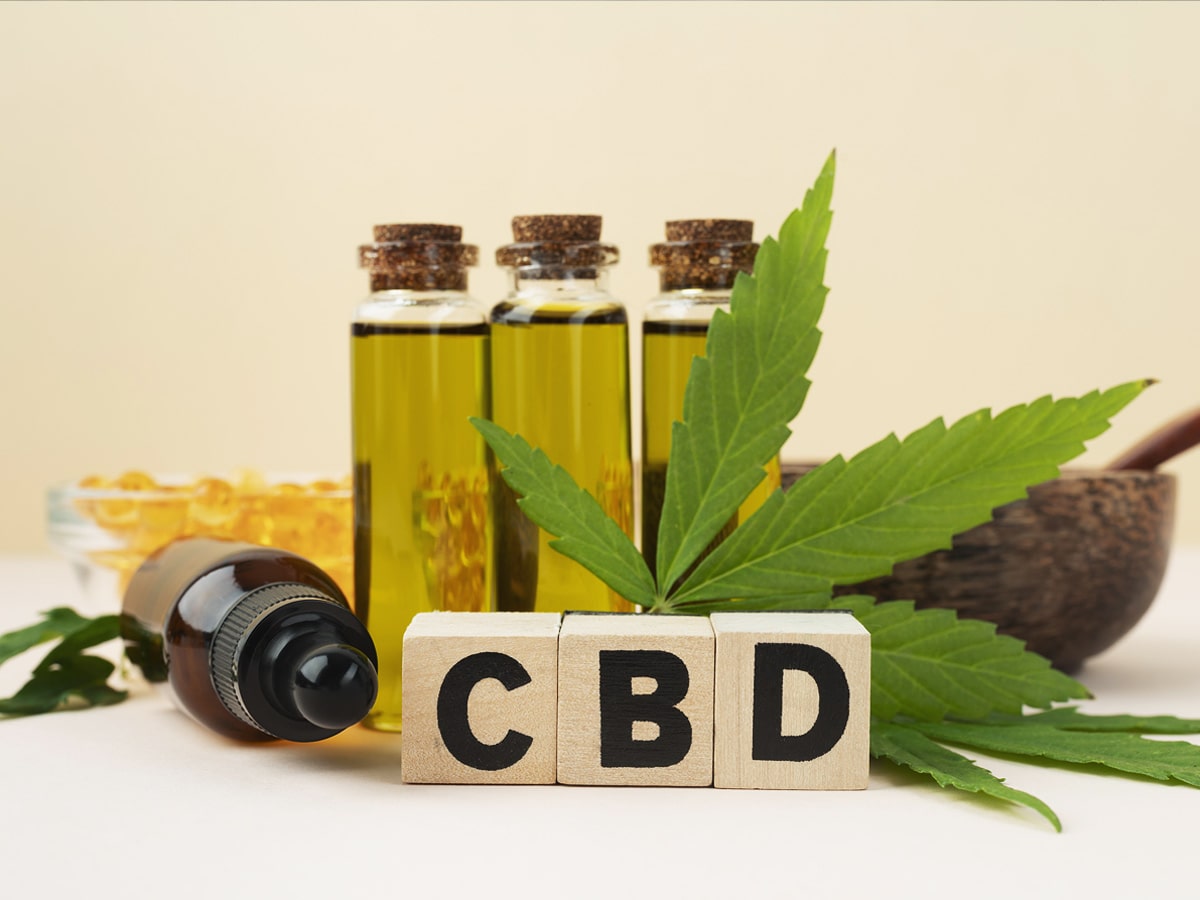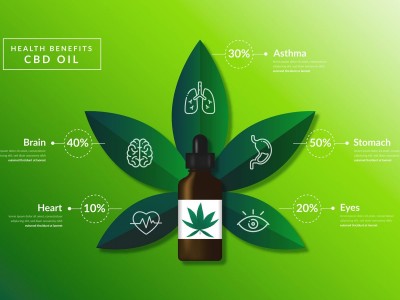
CBD oil is produced from hemp oil, which is a popular new product on the market. CBD is simply one of numerous chemical components found in marijuana. CBD does not provide the same "high" sensation as tetrahydrocannabinol (THC).
Brief Introduction of CBD oil
CBD oil is created by extracting CBD from hemp plants using a solvent or carbon dioxide extraction method. Cannabinoids and terpenes are among the medicinal components found in the extracted oil.
Growing popularity and widespread use. CBD oil has received a lot of interest due to its possible medical properties. It is believed to act by altering the endocannabinoid system, which regulates pain, emotion, sleep, and immune response.
Pain management and inflammation reduction
Pain relief, inflammation reduction, anxiety relief, improved sleep, and anticonvulsant effects for certain forms of epilepsy are among potential CBD oil health benefits. While there is promising evidence that CBD oil may be beneficial, the effects may vary depending on the ailment being treated.
What Exactly Is CBD Oil?
CBD oil is derived
from hemp, which is then processed into a product. Two of the most prevalent
methods are CO2 extraction and solvent extraction. CBD, or cannabidiol, is a
chemical component of marijuana. It does not create drunkenness in the same way
as THC does.
Different types of CBD oil (full-spectrum, broad-spectrum, isolate)
CBD oil comes in a variety of forms, including tinctures, tablets, topical creams, and sweets, their compounds are based on the full-spectrum, broad-spectrum, and isolate. Full-spectrum CBD oil contains extra beneficial compounds in addition to cannabinoids and terpenes. In contrast, THC is not present in broad-spectrum CBD oil. CBD isolate is CBD in its purest form.
Legal considerations and THC content
The legislation and THC concentration are two examples of such factors. The selling of CBD oil derived from hemp with less than 0.3% THC is not prohibited by the federal government of the United States. This, however, may not be the case in other states. Make sure you understand the regulations in your region. THC content has the greatest influence on psychotropic effects. To prevent intoxication, CBD oil should contain just trace amounts of THC.
The Potential Health Benefits of CBD Oil
According to recent studies, CBD oil may offer health benefits. Among the alleged benefits are:
Pain management and inflammation reduction
The capacity of CBD
oil to alter the endocannabinoid system, which is involved in pain signal
processing, explains its promise for alleviating chronic pain. Furthermore, it
may have anti-inflammatory properties, making it effective in the treatment of
inflammatory illnesses such as arthritis.
Stress and anxiety are reduced
CBD oil has been demonstrated to have sedative qualities, making it potentially effective in the treatment of anxiety and stress. Serotonin receptors, which play a role in mood and anxiety modulation, might be disrupted.
Insomnia Treatment and Improved Sleep
CBD oil may help individuals sleep better by alleviating symptoms like stress and pain. It has the ability to improve sleep quality and regulate irregular sleep cycles.
Potential benefits for seizure disorders and epilepsy
CBD oil is arguably best recognized for its use in the treatment of some kinds of epilepsy. Seizures may be decreased in frequency and severity, and this therapy has shown promise in individuals with rare seizure illnesses.
Emerging research on other potential health benefits
New investigations on additional health benefits are being conducted.
CBD oil is being studied for its medical potential, with research examining its use for anything from neurological diseases to cancer symptoms to acne to addiction. These potential benefits, however, must be researched further. Before incorporating CBD oil into your health routine, consult with a medical practitioner, particularly if you have any prior medical conditions or are taking any other medications, since individual sensitivities to CBD oil may vary.
What Is the Impact of CBD Oil on the Body?
The endocannabinoid system (ECS) is a network of receptors, enzymes, and endocannabinoids that work together to govern a broad variety of human activities; CBD oil interacts with the body via this system. Although CBD oil has grown in popularity as a natural health supplement, more research is needed to fully understand its potential benefits and the most effective ways of usage. Understanding the physiological effects of CBD oil requires an understanding of the following factors.
In General, Regarding the Endocannabinoid System
The ECS aids in the maintenance of the body's internal balance, known as homeostasis. This system is made up of cannabinoid receptors, endocannabinoids, and enzymes that metabolize endocannabinoids.
Interaction between CBD and cannabinoid receptors
CBD, like THC, has an indirect impact on cannabinoid receptors in the ECS. CBD, on the other hand, influences how receptors react to other cannabinoids by altering their activity. This discourse has the potential to alter physiological systems such as pain perception, mood, and immunity.
Influence on neurotransmitters and signaling pathways
CBD impacts
neurotransmitters, the chemical messengers in the brain, by interacting with
receptors connected to mood, anxiety, and pain. This alteration in signaling
has an influence on inflammation, oxidative stress, and neuroprotection.
The precise mechanisms by which CBD exerts its effects are still being researched, but early discoveries indicate that it may boost endogenous endocannabinoids, block the breakdown of certain chemicals, and impact receptors that are not cannabinoid receptors. These characteristics assist to explain why it has therapeutic potential.
Factors to consider when selecting CBD oil (source, extraction method, potency)
Cannabidiol (CBD) effects are varied and may vary depending on a variety of circumstances, including dosage, individual biochemistry, and the ailment being treated. More research is needed to fully understand the complexity of CBD's interaction with the body and its potential medical benefits.
How to Select the Best CBD Oil
Choosing the correct CBD oil is an important step in assuring its efficacy and safety. Here are a few things to think about.
Understanding product labeling and jargon
To make educated
judgments, get familiar with CBD product labeling and terminology. Look for
information on CBD content, THC levels, components, and recommended
applications. Terms like "full-spectrum," "broad-spectrum,"
and "CBD isolate" indicate the kind and content of CBD oil.
Considerations for Choosing CBD Oil
Consider the source of
CBD, ideally organically produced hemp to avoid pesticides and impurities. The
extraction process, such as CO2 extraction or solvent-based extraction, might
have an effect on the end product's quality. Furthermore, potency levels are
critical, since larger quantities may be more appropriate for specific circumstances.
Quality assurance and third-party lab testing
Select CBD oil from
companies that provide third-party lab testing. This means that the product has
been subjected to independent testing to validate its CBD and THC levels, as
well as the absence of impurities such as heavy metals or pesticides. To
maintain transparency and quality assurance, examine certificates of analysis
(COAs).
Dosage concerns and determining the appropriate strength
Finding the right CBD oil dose and strength is critical. Begin with a little dose and gradually increase as required. To discover the appropriate dose for your unique requirements, speak with a healthcare expert who is informed with CBD. Consider your physical weight, intended outcomes, and the severity of your ailment.
Dosage considerations and finding the right strength
Remember that everyone
reacts differently to CBD oil, and choosing the correct product may need some
trial and error. Be aware of your body's reaction and make adjustments as
needed.
Third-party lab testing and quality assurance
You may make an educated selection when selecting CBD oil that best meets your requirements and tastes by considering these criteria, comprehending product labels, validating quality via third-party lab testing, and determining the appropriate dose.
It is important to buy CBD oil from a reputable brand that adheres to proper manufacturing standards and provides independent lab testing to ensure the product's potency and safety. Furthermore, if you have any prior medical conditions or are on any other medications, you should consult with a healthcare professional.


